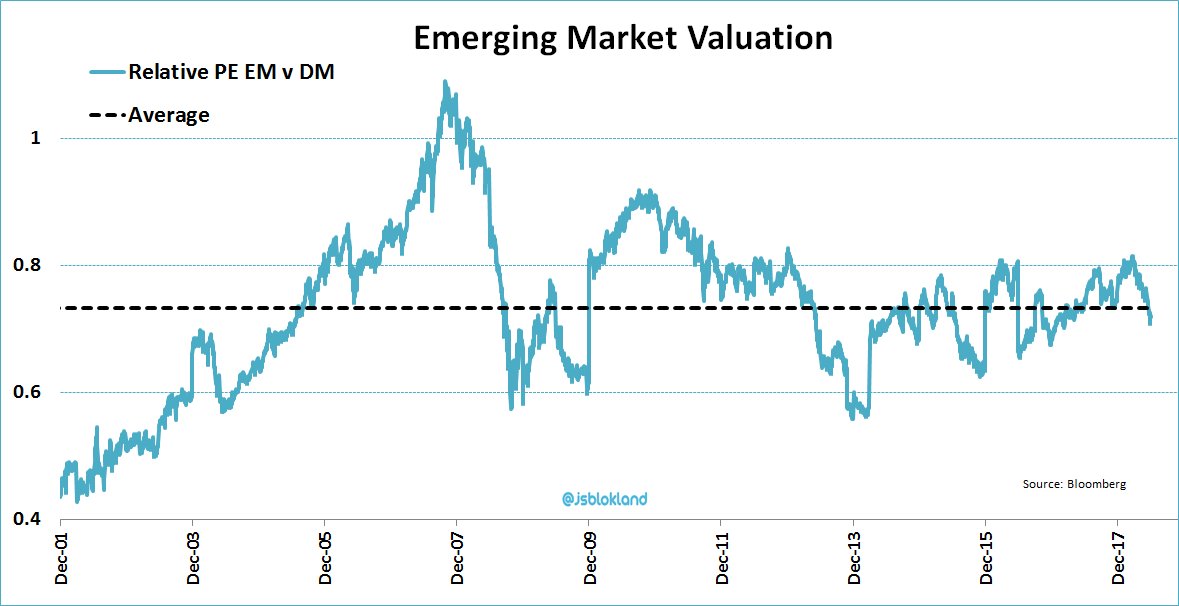Source: DRHP Filings of HDFC AMC
Chart: Emerging Markets Valuations
Source: Jeroen Blokland
Top 5 Holdings of Vanaja Sundar Iyer
This post is in continuation of my coat tailing series (see here)
To know what other top investors are buying/holding/selling in India, subscribe to our Investor Wisdom Newsletter
Vanaja Sundar Iyer is the better half of well known investor Sundar Iyer
Her top 5 holdings as on 31 March,2018 as per Stock Exchanges is given below:
| Company Name | NSE Symbol | Entity | Value (In Crores) |
| Kaya Ltd | KAYA | Vanaja Sundar Iyer | 14.24 |
| Camlin Fine Sciences Ltd | CAMLINFINE | Vanaja Sundar Iyer | 23.66 |
| Federal-Mogul Goetze (India) Ltd | FMGOETZE | Vanaja Sundar Iyer | 24.43 |
| Lumax Industries Ltd | LUMAXIND | Vanaja Sundar Iyer | 24.85 |
| Jamna Auto Industries Ltd | JAMNAAUTO | Vanaja Sundar Iyer | 85.68 |
Linkfest: 03 July, 2018
Some stuff I am reading today morning:
ICICI Securities IPO : A 240 Cr Scandal (ET)
Fortis: Singh Vs Singh (Mint)
Vedanta to delist from LSE (BS)
HDFC AMC forced to scrap pre-IPO allotment (BQ)
Interview with Mittul Kalawadia (BL)
Keeping eyes open in the stock markets (Bala)
14 points to keep in mind while buying small cap stocks (Shagun Jain)
How I evaluate an investment (Brent Beshore)
Meandering thoughts on Manpasand Beverages (MFCritic)
Over 800 Crypto currencies are now dead (CNBC)
The Book ‘Disrupt & Conquer-How TTK Prestige Became a Billion $ Company’ is authored by T.T. Jagannathan, the Head of the TTK Group and writer Sandhya Mendonca.
The TTK Group is amongst the oldest and most respected names in Indian Business.
It was started by TT Krishnamachari, who later served as the Indian Finance Minister, in 1928.
TT Jagannathan is his grandson and the book descibes with disconcerting honesty his forays into the world of business.
TT Jagannathan was a gold medallist at IIT Madras and was pursuing an academic career at Cornell University,USA when his parents summoned him in 1972 back home to manage the business.
The Business was floundering with Crores of debt (at its peak of around 14 Cr…a massive amount then) and no operating income to service it.In that era of scarce capital, his father had borrowed money at rates as high as 40%.
TT Jagannathan spent the next decades of his life trying to bring the businesses back in shape and pay off the debts.In the book, he writes: “My great regret is that I was not able to clear all the loans that the Group had accumulated while my mother was alive”
It took TT Jagannathan around 28 years (from 1972 -2000) to pay off all his debts.
How TT Jagnanathan turned around the companies is a fascinating story.It brings home the importance of common sense and hard work.
One thing that stuck me was the super importance of brands.TTK had started life as the distributor of other people’s brands.But as one by one, as the JVs broke up (sometimes after decades), you are left with the distribution but have no product to sell
Another important takeaway is that of product expansion.For many years, investors had ignored TTK Prestige stock. The company was famous for its pressure cooker but sales were stagnant.After all, everyone who wanted a pressure cooker already had one and the product life was 50 years ! Its a truism to say that most pressure cookers have outlasted the kitchens they were built for !TTK Prestige then expanded its product portfolio to include kitchen appliances etc and is now present in almost 300 Million Indian households
TTK Prestige is a story of wealth creation…the share price went from Rs.7 per share in 2003 (market cap of around 100 Cr) to around Rs.5,800 per share (market cap of around 6,800 Cr)
Another takeaway for me was the attitude of the next generation of family promoters.TT Jagannathan has 3 sons – all 3 are highly educated and qualified (from Cornell, no less).Yet all 3 are following their own careers and interests.The Company is now completely managed by professionals.
I was stuck by TT Jagannathan’s decision to have a professional CEO instead of his own sons : “But what else could I do?What if I nominated one of my sons to become the next Managing Director and he were to make a mess of it?There would be a lot more difficulty in removing a son than in replacing someone from outside the family.My children are in agreement with me that running the company should be entrusted to professional.It takes a lot of guts though, to take such a decision.”
I would strongly recommend this book to those interested in Indian Business.


